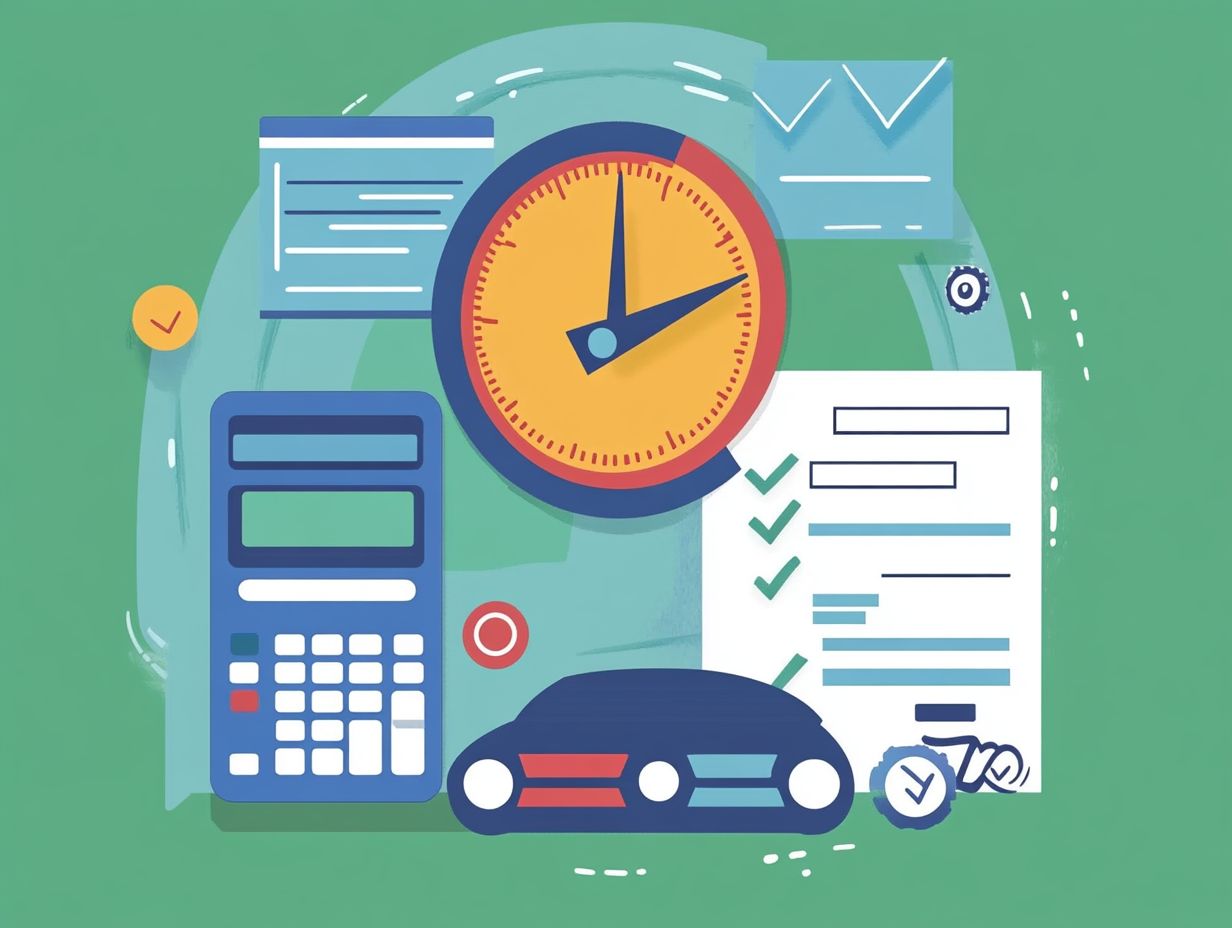Top 10 Factors That Affect Your Car Loan Approval
When securing a car loan, understanding the key factors that influence your approval chances can truly make a significant difference.
From your credit score to the type of vehicle you wish to purchase, various elements are pivotal in the lender’s decision-making process.
This article delves into the top 15 factors that can impact your car loan approval, offering insights that will help you navigate the financing landscape with confidence.
Whether you re a first-time buyer or considering an upgrade, being well-informed will empower you to make better financial choices. Let s explore these crucial insights!
Contents
- Key Takeaways:
- 1. Credit Score
- 2. Debt-to-Income Ratio
- 3. Employment History
- 4. Down Payment Amount
- 5. Loan Amount and Term
- 6. Type of Vehicle
- 7. Lender Requirements
- 8. Co-Signer or Guarantor
- 9. Age of the Vehicle
- 10. Financial Stability
- 11. Previous Loan History
- 12. Current Interest Rates
- 13. Loan Application Timing
- 14. Credit Utilization
- 15. Negotiation Skills
- Frequently Asked Questions
- What are the top 10 factors that affect your car loan approval?
- How does my credit score affect my car loan approval?
- Why is my income important for car loan approval?
- What is a debt-to-income ratio and how does it affect my car loan approval?
- Is a down payment necessary for car loan approval?
- What is the ideal loan term for car loan approval?
- Why do lenders consider the age and mileage of the vehicle for car loan approval?
- Does the loan amount affect my car loan approval?
- Can having a co-signer improve my chances of car loan approval?
- Do different lenders have different policies for car loan approval?
Key Takeaways:

- Credit score is a major factor in car loan approval, with higher scores increasing chances of approval and better interest rates.
- Debt-to-income ratio is another important factor, as lenders want to ensure borrowers can afford monthly payments.
- Employment history and stability can also affect loan approval, as it shows the ability to make consistent payments.
1. Credit Score
Your credit score plays an important role in securing an auto loan, as it reflects your credit history and ability to repay.
This score significantly influences lenders’ decisions when it comes to approving loans for vehicle financing. A strong credit score not only enhances your chances of loan approval but can also lead to lower interest rates and reduced monthly payments, making the financing much more manageable.
Lenders delve into credit reports, which detail your borrowing history and payment timeliness, to assess your ability to repay loans.
Try these simple strategies to improve your score:
- Pay down existing debts
- Consistently make on-time payments
- Review your credit reports for mistakes that could adversely affect your score
Taking these easy steps can really boost your chances of securing favorable loan terms! Take action now to enhance your credit profile.
2. Debt-to-Income Ratio
The debt-to-income ratio is a crucial metric that lenders examine to evaluate your financial health and repayment ability, and it plays a significant role in the auto loan approval process.
This ratio is calculated by dividing your total monthly debt payments by your gross monthly income, allowing lenders to get a good idea of how much of your income is allocated to existing debts.
A lower ratio often leads to better loan terms, including reduced interest rates and more favorable monthly payments. A higher ratio may raise concerns for lenders about potential financial strain, prompting them to offer less advantageous terms or even deny your application outright.
If you’re managing outstanding debts, employing strategies such as prioritizing high-interest obligations and sticking to a budget can significantly enhance your financial standing. These steps will make it easier for you to secure the financing necessary for your next vehicle.
3. Employment History
A stable employment history can significantly bolster your credibility in the eyes of lenders, enhancing your chances of securing a favorable auto loan approval.
Lenders often see consistent employment as a strong signal of financial reliability, associating long-term positions with a dependable income. This perception can directly influence the terms of your loan, including interest rates and the amount you may qualify for.
Borrowers with a solid job history typically enjoy the benefits of lower rates, while those who frequently change jobs might encounter higher costs or more stringent conditions.
To effectively present your employment information in loan applications, ensure that you clearly outline details such as your job title, duration of employment, and salary. Including pay stubs or tax returns can further strengthen your application, demonstrating both stability and your ability to repay the loan.
4. Down Payment Amount
The down payment you make when purchasing a vehicle can significantly influence your loan amount, interest rate, and overall monthly payments for your auto loan.
By contributing a larger initial payment, you reduce your overall loan balance and enhance your vehicle equity from the start. You’ll own a greater portion of the car earlier, which can be advantageous if you decide to sell or trade it in later.
A larger down payment typically leads to lower monthly installments, making your budget more manageable. Start saving now to make your dream car a reality!
This strategy helps you track your progress and reach your goal, ensuring a smoother car-buying experience.
5. Loan Amount and Term
Understanding the loan amount and term is crucial for effective budgeting when considering an auto loan. These factors directly impact your monthly installments and the total interest you’ll pay over time.
Be aware that a higher loan amount can significantly increase the total cost of financing if not managed wisely. An extended loan term might ease immediate financial pressure but could mean paying more in interest over the years.
Interest rates are essential in this equation. They fluctuate based on the loan length and market conditions, affecting both the affordability of your payments and the overall cost of the vehicle.
When thinking about refinancing, evaluate your current loan terms closely. This diligence helps you spot opportunities that suit your evolving financial situation, ensuring you choose options that align with your long-term financial goals.
6. Type of Vehicle

The type of vehicle you choose whether a new car or a pre-owned one can significantly shape your auto loan options, interest rates, and overall financing journey.
Lenders assess vehicles based on their purchase price, projected resale value, and how much their value decreases over time. Typically, new vehicles maintain their value better in the early years, leading to lower loan amounts and more advantageous terms compared to older models.
Vehicle equity is vital when evaluating financing options. A car with substantial equity can act as collateral for a loan, possibly reducing interest rates. On the flip side, vehicles that depreciate quickly may not provide the same level of security, influencing lender evaluations and your financing options.
7. Lender Requirements
Each lender has specific requirements for auto loan approval, which can vary dramatically between financial institutions, affecting your eligibility as a borrower.
Lenders will scrutinize key factors like your credit score, often needing to surpass a certain threshold to secure favorable terms. Your debt-to-income ratio reveals whether you can manage additional debt and reflects your financial health.
Your employment history plays a vital role. Stable income indicates your capacity to repay the loan. To enhance your chances of approval, assess and improve these factors.
This might involve paying down existing debts, ensuring a steady income, and obtaining a copy of your credit report to fix any errors before you apply.
Ready to find your perfect auto loan? Start your journey today!
8. Co-Signer or Guarantor
Adding a co-signer or guarantor to your auto loan application can significantly enhance your chances of approval. This is especially true if your credit score or financial history isn’t where you’d like it to be.
Bringing a co-signer on board with a strong credit history can lower interest rates and provide better payment options. This partnership showcases shared financial responsibility and adds security for the lender, making it easier for you to access larger loan amounts.
However, it s crucial for both parties to understand the implications involved. Missing payments could negatively impact the credit ratings of both you and your co-signer.
This situation could lead to financial strain and tension in your relationship.
9. Age of the Vehicle
The age of the vehicle you re financing significantly influences your loan options and interest rate. It also affects the value you own in the car over time.
New cars depreciate quickly, affecting their resale value. Older models might mean lower payments and insurance costs.
By understanding this dynamic, you can evaluate the pros and cons of financing a new versus a used car. While a new vehicle may dazzle you with latest features and warranties, an older model can offer lower monthly payments.
Take your time to weigh your options; it s a big decision that can shape your future!
10. Financial Stability
Demonstrating financial stability is crucial for gaining the trust of lenders. It signals your ability to repay and plays a significant role in their decision-making process during the auto loan journey.
To convince lenders you’re financially stable, maintain a steady income and manage your debts wisely. Several factors contribute to establishing this stability.
A consistent income stream boosts lenders’ confidence in your capacity to meet future payments. Outstanding debts can impact your overall financial well-being, so it s important to keep them manageable.
A solid credit history enhances your credibility, showcasing responsible credit use and timely payments. To effectively present your financial stability in loan applications, consider the following strategies:
- Prepare a comprehensive budget that outlines your income and expenses.
- Maintain a positive credit score through timely payments.
- Ensure that your existing debts are manageable in relation to your income.
11. Previous Loan History
Your loan history, including how you ve managed payments and credit accounts, plays a crucial role in securing an auto loan. It also affects the terms lenders will offer you.
Lenders scrutinize your past financial behavior, paying attention to factors like on-time payments and current debt levels. A strong payment history builds trust and positively influences your credit score.
This can open doors to more favorable interest rates and loan amounts. Conversely, missed payments and unmanaged debts raise red flags.
Establishing a solid track record of reliable payments and effective debt management is vital if you re aiming for a significant purchase like a vehicle.
12. Current Interest Rates

Staying informed about current interest rates is essential for your financial planning when applying for an auto loan. These rates dictate the affordability of your repayment plan.
Market trends and borrower profiles affect interest rates. This creates a changing environment that needs careful navigation.
Fluctuations in economic conditions, such as inflation rates and Federal Reserve policies, lead to varying interest rates that may affect different borrowers in distinct ways.
Your credit score and financial history play crucial roles in determining the rate you might receive. To secure more favorable terms, consider strategies such as:
- Improving your credit score
- Making larger down payments
- Opting for fixed-rate loans
These strategies help you understand and plan your financial commitments effectively.
13. Loan Application Timing
The timing of your loan application can significantly impact the interest rates and loan options available to you. It s crucial to consider market trends before diving into an auto loan.
Seasonal fluctuations play a key role here. Demand for vehicles tends to surge during summer or holiday seasons, causing interest rates to vary accordingly.
Economic conditions, such as inflation rates and job market shifts, complicate your decision-making process.
By analyzing these factors, you can gain a considerable edge. Don t wait! Apply during off-peak seasons for the best deals. Late winter or early spring can be your golden opportunity!
Dealerships are eager to close deals, and banks are more likely to offer competitive rates during these times. Staying informed about economic indicators can further boost your chances of securing a better deal.
14. Credit Utilization
Managing your credit utilization is crucial. It s a key player in boosting your credit score. And we all know how that impacts your auto loan approval!
Credit utilization is calculated by dividing the total amount of credit you re using by your total credit limit across all accounts. A lower percentage reflects responsible credit management, which is vital since it makes up a significant portion of your credit score.
To optimize your credit utilization, consider these strategies:
- Keep your balances low.
- Pay off debts promptly.
- Consider requesting higher credit limits to improve your overall ratio.
Implementing these practices enhances your creditworthiness and boosts your chances of securing favorable loan terms.
15. Negotiation Skills
Effective negotiation skills can enhance your loan terms and interest rates. This enables you to secure a more favorable auto loan while also strengthening your relationship with lenders.
Approaching this process with meticulous preparation and a solid understanding of various market rates allows you to craft a compelling case for lower payments.
For example, knowing the current averages of similar loans enables you to confidently counter higher offers. Exploring different loan options, like fixed versus variable rates, helps tailor proposals that align perfectly with your financial situation.
A successful strategy might involve presenting competing offers from other lenders as leverage. This showcases that you are informed and committed to securing the best deal possible.
Frequently Asked Questions
What are the top 10 factors that affect your car loan approval?
The top 10 factors for car loan approval include: credit score, income, job history, your debt-to-income ratio, down payment, loan term, vehicle age, mileage, loan amount, co-signer, and lender policies.
How does my credit score affect my car loan approval?

Your credit score plays a crucial role in your car loan approval. Lenders rely on this score to evaluate if you are a good candidate for a loan and to set your interest rate.
A higher credit score typically leads to lower interest rates and better terms.
Why is my income important for car loan approval?
Lenders want to ensure you have the financial means to repay the loan. Your income, combined with your employment history, helps them assess your ability to make timely payments.
A higher income can also increase your chances of approval for a larger loan amount.
What is a debt-to-income ratio and how does it affect my car loan approval?
A debt-to-income ratio measures how much of your income goes toward paying off debts. Lenders prefer a lower ratio because it indicates you have enough disposable income to handle a car loan.
A high debt-to-income ratio might lead to higher interest rates or even denial of the loan.
Is a down payment necessary for car loan approval?
A down payment isn’t always required, but it can significantly influence your loan approval. A larger down payment can lower your monthly payments and reduce the overall interest you pay.
It also demonstrates to the lender that you are financially responsible and committed to your loan.
What is the ideal loan term for car loan approval?
The ideal loan term varies based on your financial situation. Generally, a shorter loan term results in lower interest rates and overall costs.
This arrangement also indicates to the lender that you can repay the loan in a shorter timeframe.
Why do lenders consider the age and mileage of the vehicle for car loan approval?
Lenders take the age and mileage of the vehicle into account because these factors affect its overall and potential resale value. A newer car with lower mileage is seen as less risky.
Conversely, an older car with higher mileage might lead to higher interest rates or even denial of the loan.
Does the loan amount affect my car loan approval?
The loan amount you seek can impact your car loan approval. Lenders generally prefer smaller loan amounts to reduce their risk.
It’s also crucial that the loan amount does not exceed the car’s value.
Can having a co-signer improve my chances of car loan approval?
If your credit score is low or you have limited credit history, a co-signer with a good credit score can enhance your chances of approval. The co-signer acts as a guarantor, helping you secure better terms and interest rates.
Do different lenders have different policies for car loan approval?
Yes, various lenders have different policies and criteria for car loan approval. Researching and comparing lenders is essential to find one that suits your financial situation and offers favorable terms.
Online lenders, banks, and credit unions may have varying requirements for car loan approval.






